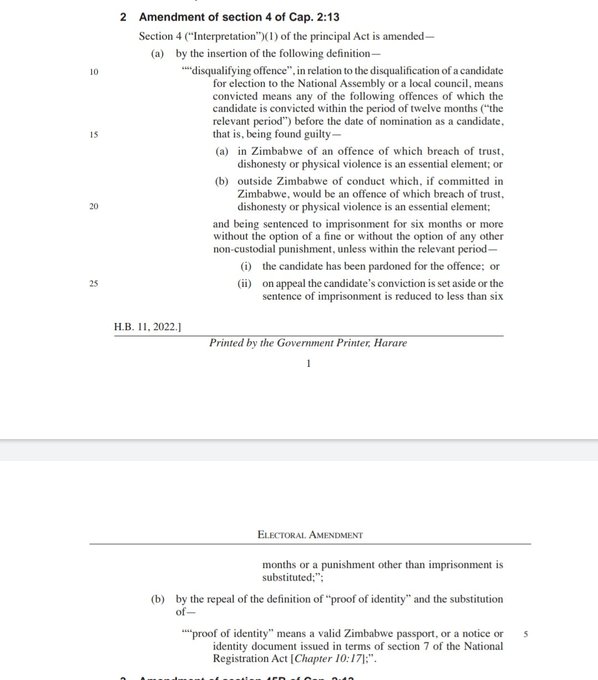Some provisions of the recently gazetted Electoral Amendment Bill, according to legal analysts, are questionable, demonstrating a lack of political will to implement comprehensive electoral reforms.
The Electoral Amendment Bill was gazetted on November 18, 2022, to fully align the Electoral Act with Zimbabwe’s Constitution that was amended (Constitution Amendment No. 2 Act) earlier this year.
The proposed electoral amendment bill outlaws the use of driver’s licences as proof of identity by persons who register as voters (Clause 2b).
It will provide for the election of the ten youth members of the National Assembly referred to in section 124(1)(c) of the Constitution as amended in 2021 (Clauses 4, 5 and 6).
The bill seeks to provide for the continued election of 60 women to Parliament under a party-list system (clause 4) and provides for the election of women on a party-list basis to provincial councils and local authorities, as seen in section 277(4) of the Constitution as amended (clauses 4, 5 and 6)
It will prevent nominations of persons who have been convicted of certain offences (clauses 7, 9) and set a time limit for the withdrawal of constituency candidates (clauses 8 and 10).
But legal experts and opposition party activists have described some of the provisions as a far cry from what democratic thinkers had been advocating for on electoral reforms.

A legal expert, Dr Vusumuzi Sibanda told CITE that the Electoral Amendment Bill’s provisions on offenders, disqualifications and pardons were a new way to exclude certain people.
“It is meant to manipulate and threaten people with expulsion for violence, which could be ordinary crimes that are not supposed to cause such disqualification,” he said.
Under Section 129(1)(i) of the Constitution, members of parliament must resign if they are convicted of a crime involving breach of trust, dishonesty, or physical violence and sentenced to six months or more in prison
Accordingly, the bill requires candidates to disclose in their nomination papers whether they have been convicted of a “disqualifying offence” in the previous 12 months and sentenced to six months or more in prison.
“The bill does not say that candidates will be disqualified if they disclose such a conviction, but implies they will be yet an Act of Parliament cannot add further disqualifications as that is already in the constitution,” Dr Sibanda explained.
According to Dr Sibanda, the proposed bill fails to achieve its goal of aligning the Electoral Act with the amended Constitution.
“More consultation with political parties and civil society was required when the bill was drafted, which would have assisted in the removal of some of its flaws. For example, the bill suggests that any candidate who discloses “disqualifying offences” will be barred from nomination, which is an unconstitutional disqualification,” he said.
“Look at the provision for an additional 30 percent of each council’s membership, which means that all local governments will have these extra female councillors. However, this means that there will be more female councillors who may not represent any particular ward.”
Veritas, a Harare-based think tank, noted that the constitutional amendments that gave rise to this Bill are being challenged in the Constitutional Court, and if they are found to be invalid, most of the Bill’s contents will be invalid as well.
“The avowed purpose of the Bill is to bring the Electoral Act into line with recent constitutional amendments, specifically those made to the Constitution by the Constitution of Zimbabwe Amendment (No. 2) Act of 2021. That Act, as well as an earlier Constitutional Amendment Act, is being challenged in the Constitutional Court by several organisations including the Law Society and Veritas, on the ground that its passage through Parliament violated the Constitution,” said the think tank.
Veritas said should the Constitutional Court find that the two Amendment Acts were invalidly passed then the Constitution must be regarded as never having been amended, meaning most of the provisions of this Electoral Amendment Bill will fall away.
“In fact, they will become unconstitutional. For example, the provisions for electing youth members of the National Assembly will be inapplicable because the unamended Constitution did not provide for youth members, the same goes for the women members of provincial councils and local authorities,” said the think tank.
“It might be better if the Bill’s introduction into Parliament were delayed until the Constitutional Court has ruled on the validity of the amendments to the Constitution, and it is to be hoped that the Court’s ruling will not be delayed.”
Iphithule Maphosa, an opposition activist, criticised the bill for failing to address key issues that political parties were always raising, such as the independence of the Zimbabwe Electoral Commission and making sure eligible people registered to vote including those in the Diaspora.
“It also fails to address the issue of fair media coverage of all political parties contesting elections, as well as how political parties will conduct themselves ethically during elections, ensuring that state institutions are non-partisan, and determining whether there will be effective resolution of electoral disputes and challenges,” he said.

